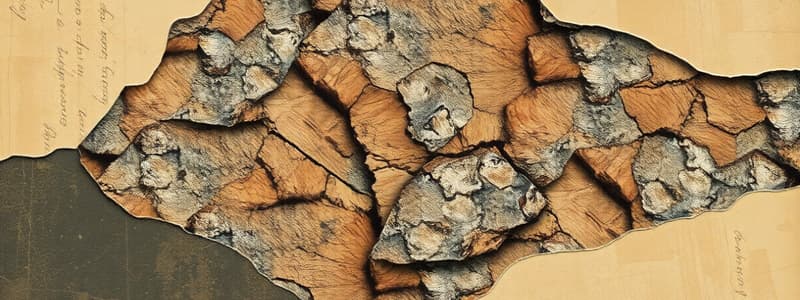Podcast
Questions and Answers
What is the primary significance of water in the process of chemical weathering?
What is the primary significance of water in the process of chemical weathering?
Water acts as the most significant agent in chemical weathering by facilitating hydrolysis, oxidation, and carbonation processes.
Explain the role of carbonic acid in chemical weathering.
Explain the role of carbonic acid in chemical weathering.
Carbonic acid, formed from carbon dioxide in water, contributes to the dissolution of minerals, enhancing weathering.
What effect does temperature and moisture have on the rate of chemical weathering?
What effect does temperature and moisture have on the rate of chemical weathering?
Higher temperatures and moisture levels increase the rate of chemical reactions involved in weathering.
Identify and describe one process of chemical weathering.
Identify and describe one process of chemical weathering.
How do biological activities influence the process of chemical weathering?
How do biological activities influence the process of chemical weathering?
What are some products of chemical weathering, and why are they important for ecosystems?
What are some products of chemical weathering, and why are they important for ecosystems?
Describe the impact of rock type on chemical weathering rates.
Describe the impact of rock type on chemical weathering rates.
Why is understanding chemical weathering important for fields like agriculture and geology?
Why is understanding chemical weathering important for fields like agriculture and geology?
Flashcards are hidden until you start studying
Study Notes
Chemical Weathering
-
Definition: The process of rock decomposition through chemical reactions, altering mineral composition and structure.
-
Key Agents:
- Water: Most significant agent; facilitates hydrolysis, oxidation, and carbonation.
- Acids:
- Carbonic Acid: Formed from carbon dioxide in water; contributes to the dissolution of minerals.
- Organic Acids: Produced by decaying organic matter; enhances weathering of rocks and minerals.
- Oxygen: Supports oxidation processes that can change mineral composition.
-
Processes:
- Hydrolysis: Reaction of minerals with water, resulting in the breakdown of silicate minerals (e.g., feldspar to clay).
- Oxidation: Reaction of oxygen with minerals, particularly those containing iron, resulting in rusting and weakening of the rock.
- Carbonation: Reaction between carbon dioxide and minerals; leads to the formation of soluble carbonates.
-
Factors Influencing Chemical Weathering:
- Climate: Higher temperatures and moisture increase the rate of chemical reactions.
- Rock Type: Different minerals weather at different rates; softer minerals like limestone are more susceptible.
- Biological Activity: Organisms can produce acids that enhance weathering; roots of plants often contribute to this process.
-
Products of Chemical Weathering:
- Clay Minerals: Formed from the breakdown of silicate minerals.
- Dissolved Ions: Such as calcium, magnesium, potassium, and sodium, which enter solution and can be transported by water.
- Soil: Resulting from the accumulation of weathered material, essential for plant growth.
-
Importance:
- Soil Formation: Provides essential nutrients for plants and contributes to soil structure.
- Geological Changes: Alters landscapes, leading to diverse ecosystems and impacts on human activity.
-
Examples:
- Granite Weathering: Weathers to produce kaolinite clay.
- Limestone Weathering: Dissolves in weakly acidic waters, potentially forming karst landscapes.
Understanding chemical weathering is vital for fields such as geology, agriculture, and environmental science, as it significantly influences soil development and ecosystem health.
Chemical Weathering
- The process where rock breaks down due to chemical reactions, changing its mineral makeup and structure.
- Water is the most important agent, aiding processes like hydrolysis, oxidation, and carbonation.
- Acids like carbonic acid (from dissolved CO2) and organic acids (from decaying matter) accelerate weathering.
- Oxygen plays a role in oxidation, causing minerals to rust and weaken.
Chemical Weathering Processes
- Hydrolysis: The breakdown of silicate minerals like feldspar into clay minerals by reacting with water.
- Oxidation: Iron-containing minerals react with oxygen, resulting in rusting and weakening the rock.
- Carbonation: Carbon dioxide reacts with minerals, forming soluble carbonates.
Factors Influencing Chemical Weathering
- Climate: Higher temperatures and moisture speed up chemical reactions.
- Rock Type: Different minerals weather at different rates, with softer minerals like limestone weathering faster.
- Biological Activity: Organisms produce acids, accelerating weathering. Plant roots contribute significantly.
Products of Chemical Weathering
- Clay Minerals: Formed from the breakdown of silicate minerals.
- Dissolved Ions: Calcium, magnesium, potassium, and sodium dissolve and are transported by water.
- Soil: Weathering products accumulate, forming essential soil for plant growth.
Importance of Chemical Weathering
- Soil Formation: Provides nutrients for plants, contributing to soil structure.
- Geological Changes: Alters landscapes, creating diverse ecosystems and impacting human activities.
Examples of Chemical Weathering
- Granite Weathering: Weathers into kaolinite clay.
- Limestone Weathering: Dissolves in weakly acidic water, contributing to karst landscapes.
Studying That Suits You
Use AI to generate personalized quizzes and flashcards to suit your learning preferences.




